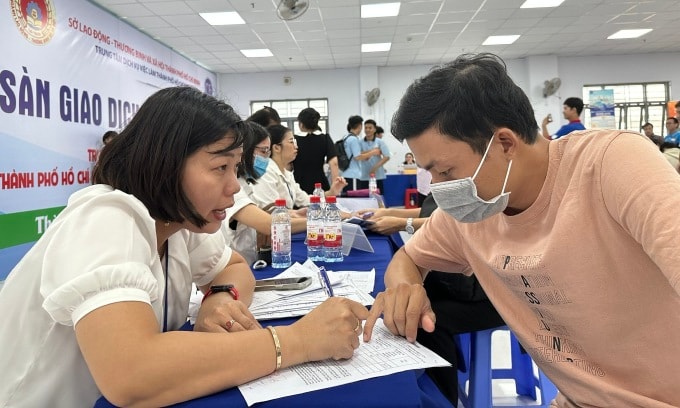After many years of working for the government, many civil servants are happy with the support money after they retire because of the restructuring and streamlining, but they are worried about how to find a new job when they are 40 years old.

Mr. Nguyen Minh Thai is a civil servant of a political organization in the city. In 2009, he graduated from university with a major in accounting and worked in the public sector. In 2013, he passed the civil service exam and was transferred to a newly established unit, where he has been working ever since. He has been in charge of many tasks related to salaries, labor laws, and union activities. However, in order to implement Resolution 18 on streamlining the apparatus, his unit will be dissolved.
Nearly ten days ago, the superiors invited all the cadres, civil servants, public employees, and workers of the unit to a meeting to discuss the policy of streamlining the apparatus. The leader informed about the expected amount of money each person would receive according to Decree 178 and according to the specific policy of Ho Chi Minh City, he alone received nearly one billion VND.
"My feelings are quite mixed," said Mr. Thai. A billion VND is quite a lot for a civil servant couple because "even if they work for ten more years, they won't be able to save it." However, for him, the most important thing is the monthly income to raise two children, 8 and 12 years old, while his wife's salary can only support one child.
Mr. Thai calculated that one billion dong "seemed a lot" but if he took it out to spend, it would be gone quickly, buying land was not enough, saving and receiving interest would bring him 5 million dong per month. He also did not know where to invest because he had no experience and was afraid of losing his capital. After much consideration, Mr. Thai planned to deposit the money in the bank when he received it and then find a new job.
"I am confident in my qualifications but I am afraid that at the age of 40, it will be difficult to be accepted by the market," Mr. Thai worried. Over the years, his work has brought him into contact with many businesses, so he has created some relationships. In the past week, he has asked around a few places and expressed his willingness to work as a seasonal employee or on a trial basis for several months to learn the job and prove his ability. In addition, he has also studied some teaching courses at Ho Chi Minh City University of Education. With many years of experience, he believes he can teach supplementary classes on labor management and legal advice for businesses.
"I set a goal that after leaving the government, I will get used to the labor market, and my income will only be enough to raise my children. I will live a frugal life," said Mr. Thai.
Also leaving her job due to the dissolution of her unit, Ms. Thu Dan, 53 years old, a civil servant in Ho Chi Minh City, is entitled to immediate retirement benefits "so she is not too worried". The female civil servant has more than 31 years of social insurance contributions, so her maximum pension is up to 75%.
More than a week ago, she was invited by the leaders to inform them about Resolution 18 and the expected support amount according to Decree 178 and Ho Chi Minh City's own policy of about 3 billion VND. After being consulted, she decided to submit her resignation. She plans to buy an apartment to rent out for monthly income. Because she receives her pension immediately, she is not under pressure about her income, however, Ms. Dan plans to still find a suitable job so that "she does not become sluggish".
"I will look for seasonal jobs such as consulting on policies and labor laws for businesses. There is no pressure on money, but I am afraid of sitting around doing nothing. After more than 30 years of working, staying at home will be very boring," said Ms. Dan.
Ms. Dan and Mr. Thai are two of about 100,000 officials, civil servants and public employees affected by the streamlining of the apparatus, according to information given by Deputy Prime Minister Nguyen Hoa Binh at a conference of the Ministry of Home Affairs late last year. To support those who have left their jobs, the Government issued Decree 178 with 8 outstanding financial support policies. Among them, some people receive subsidies and are eligible for pensions immediately, but many also have to find new jobs.
Ms. Nguyen Thu Trang, Manpower Brand Director, ManpowerGroup Vietnam, said that many industries in the market are in dire need of labor. Therefore, assuming that 100,000 civil servants and public employees are looking for jobs, it will be a source of additional human resources for businesses.
"The market is ready to accept. For qualified workers, age is not a big issue," Ms. Trang assessed. Analyzing the advantages of retired officials, civil servants and public employees, a representative of ManpowerGroup Vietnam said that most of them are workers with university degrees or higher, which is a group that the market is very "thirsty". In particular, civil servants are people who have worked for a long time in the state environment, so they understand the regulations, policies and procedures when working with administrative units. This is a skill that many businesses need. In addition, the experience accumulated during the working process and being properly trained are the foundation for officials and civil servants to innovate and be creative when working in the business environment.
However, Ms. Trang also said that this group will face challenges when entering the labor market such as not understanding the recruitment process, salary negotiation, and how to assign work in the enterprise. Officials and civil servants may experience cultural shock and have to deal with problems according to procedures that are not the same as those of the state.
"The market needs this group of workers, the important thing is how the two sides can meet each other," said Ms. Trang. As a multinational corporation specializing in providing human resources solutions, operating in many countries, the representative of ManpowerGroup Vietnam said that it is not uncommon for governments to streamline their apparatus and cut staff. The experience of other countries is that in addition to cash support, governments also build career transition programs and support workers in finding new jobs.
According to Ms. Trang, based on data on qualifications, age, and desires of retired officials and civil servants, the career transition program will have experts with in-depth expertise to consult on occupations, update, and improve skills needed by the market. This period can last 3-6 months, when civil servants are ready, they will be introduced to suitable jobs.
"There needs to be a transition and shock reduction program so that civil servants and public employees can continue to work well in the labor market after leaving the state," Ms. Trang proposed.

Meanwhile, Dr. Le Duy Binh, Director of Economica Vietnam, said that the process of streamlining the apparatus is taking place strongly, so it is predicted that more than 100,000 cadres, civil servants and public employees will leave the state. The group of people who have retired can be divided into many components including: Those who have reached retirement age and no longer need to work; young people who continue to work for businesses and start their own businesses. Depending on the needs of each component, the state needs to have different support policies.
According to experts, the common feature is that most officials and civil servants who quit their jobs receive a fairly large amount of support. With hundreds of thousands of people and support amounts of up to billions of VND per person, billions of USD will enter the market. For those who continue to work, support to improve skills and connect with jobs is necessary. However, the state also needs to have programs to help them manage their personal finances and improve the investment and business environment to encourage them to start their own businesses.
Dr. Le Duy Binh said that without a reliable investment channel, these billions of dollars could go into land and gold, contributing to the heat of this market. "This is absolutely not good for the economy," the expert said. Therefore, the government needs to soon have policies that are attractive enough to mobilize these billions of dollars to invest in production and business or buy bonds for key national projects, but at the same time help retired officials and civil servants have a source of income from investment channels.
Le Tuyet
* Character names changed upon request
PV (synthesis)